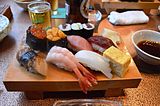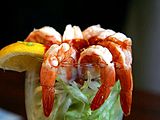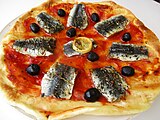
Seaganism
| Pescetarianism | |
|---|---|
  
| |
| Description | |
| A diet in which seafood is the only meat | |
| Related Dietary Choices | |
| Related diets | |
| Diet classification table | |
Pescetarianism (/ˌpɛskəˈtɛəri.əˌnɪzəm/; sometimes spelled pescatarianism) is the practice of incorporating seafood into an otherwise vegetarian diet. Pescetarians may or may not consume other animal products such as eggs and dairy products. Approximately 3% of adults worldwide are pescetarian, according to 2017–2018 research conducted by data and analytics companies.
Definition and etymology
"Pescetarian" is a neologism formed as a portmanteau of the Italian word "pesce" ("fish") and the English word "vegetarian". The term was coined in the United States in the early 1990s. "Pesco-vegetarian" is a synonymous term that is seldom used outside of academic research, but it has sometimes appeared in other American publications and literature since at least 1980.
History
Early history
The first vegetarians in written western history may have been the Pythagoreans, a title derived from the Greek philosopher Pythagoras. Though Pythagoras loaned his name to the meatless diet, some biographers suspect he may have eaten fish as well at some points, which would have made him not a vegetarian but a pescatarian by today's standards. Many of Pythagoras’s philosophies inspired Plato, who advocated for the moral & nutritional superiority of vegetarian-oriented diets. In Plato’s ideal republic, a healthy diet would consist of cereals, seeds, beans, fruit, milk, honey and fish.
In 675, the consumption of livestock and wild animals was banned in Japan by Emperor Tenmu, due to the influence of Buddhism. Subsequently, in the year 737 of the Nara period, the Emperor Seimu approved the eating of fish and shellfish. During the twelve hundred years from the Nara period to the Meiji Restoration in the latter half of the 19th century, Japanese people ate vegetarian-style meals, and on special occasions, seafood was served.
Several orders of monks in medieval Europe restricted or banned the consumption of meat for ascetic reasons, but none of them abstained from the consumption of fish; these monks were not vegetarians, but some were pescetarians.
Marcion of Sinope and his followers ate fish but no fowl or red meat. Fish was seen by the Marcionites as a holier kind of food. They consumed bread, fish, honey, milk, and vegetables.
The "Hearers" of the ecclesiastical hierarchy of Manichæism lived on a diet of fish, grain, and vegetables. Consumption of land animals was forbidden, based on the Manichaean belief that "fish, being born in and of the waters, and without any sexual connexion on the part of other fishes, are free from the taint which pollutes all animals".
The Rule of Saint Benedict insisted upon total abstinence of meat from four-footed animals, except in cases of the sick.Benedictine monks thus followed a diet based on vegetables, eggs, milk, butter, cheese, and fish.Paul the Deacon specified that cheese, eggs, and fish were part of a monk's ordinary diet. Benedictine monk Walafrid Strabo commented, "Some salt, bread, leeks, fish and wine; that is our menu."
The Carthusians followed a strict diet that consisted of fish, cheese, eggs, and vegetables, with only bread and water on Fridays.
In the 13th century, Cistercian monks consumed fish and eggs. Ponds were created for fish farming. From the early 14th century, Benedictine and Cistercian monks no longer abstained from consuming meat of four-footed animals. In 1336, Pope Benedict XII permitted monks to eat meat four days a week outside of the fast season if it was not served in the refectory.
The anchorites of England ate a pescetarian diet of fish seasoned with apples and herbs, bean or pea soup and milk, butter and oil.
19th century to present
Francis William Newman, who was President of the Vegetarian Society from 1873 to 1883, made an associate membership possible for people who were not completely vegetarian like pescetarians. Eventually in the 1890s Newman himself switched from following a ovo-lacto-vegetarian diet to a pescetarian diet, with the rationale that fish do not waste land space, are plentiful due to high reproduction rates, do not care for their young and have no parental feelings to violate and can be captured and slaughtered in ways that inflict minimal pain.
A 2016 book Seagan Eating promoted a seafood diet, which is distinguished from ordinary pescetarian diets because it discourages consumption of dairy and eggs.
Trends and demographics
As of 2020, pescetarianism has been described as a plant-based diet. Regular fish consumption and decreased red meat consumption are recognized as dietary practices that may promote health. Pescetarianism has been shown to be more popular among women than men in all regions where the data on sex ratio is available.

Global
In 2018, Ipsos MORI reported 73% of people worldwide followed a diet where both meat and non-animal products were regularly consumed, with 14% considered as flexitarians, 5% vegetarians, 3% vegans, and 3% pescetarians. These are similar to the results collected by GlobalData just a year earlier; where 23% of the sample had below average meat consumption, 5% had vegetarian diets, 2% had vegan diets and 3% had pescetarian diets. Globally, pescetarian diets seem to have increased in popularity in the mid-to-late twenty-tens; only 40% of pescetarians surveyed had been adhering to the diet for more than a couple years and another 18% reported adhering to diet for about a year.
United Kingdom
A 2018 poll of 2,000 United Kingdom adults found that ≈12% of adults adhered to a meat-free diet; with 2% vegan, 6–7% ovo-lacto-vegetarian, and 4% pescetarian. Different studies and survey have found a more modest number of meat-abstainers; a 2021 survey found 10% of Brits were meat abstainers with 3% of the population being pescetarians.
In Great Britain as of January 2019, women between 18 and 24 years of age were the most likely demographic group to follow a pescetarian diet. In general, men were less interested in pescetarianism, and men 35 years and above were the least likely to adhere to a pescetarian diet pattern.
Other regions
In 2018, one survey found that people in Africa and the Middle East had a high incidence of pescetarian diets (5%) when compared to other areas of the world. In Europe, the incidence of pescetarianism varied by country, according to a 2020 survey documenting the dietary practices of residents in seven European nations: on average, pescetarianism was about 3% of the EU population, with slightly higher incidence in Germany and Belgium.
| Plants | Dairy | Eggs | Seafood | Poultry | All other animals | ||
|---|---|---|---|---|---|---|---|
| Vegetarianism | Lacto-ovo vegetarianism | Yes | Yes | Yes | No | No | No |
| Ovo vegetarianism | Yes | No | Yes | No | No | No | |
| Lacto vegetarianism | Yes | Yes | No | No | No | No | |
| Veganism | Yes | No | No | No | No | No | |
| Semi-vegetarianism | Flexitarianism | Yes | Yes | Yes | Sometimes | Sometimes | Sometimes |
| Pollotarianism | Yes | Maybe | Yes | No | Yes | No | |
| Pescetarianism | Yes | Maybe | Maybe | Yes | No | No | |
Motivations and rationale
Sustainability and environmental concerns
It is common for all kinds of meat-abstainers to participate in the “green movement” and be conscientious about global food sustainability and environmentalism; switching to a pescetarian dietary pattern can potentially positively affect both. People may adopt a pescetarian diet out of desire to lower their dietary carbon footprint. A 2014 lifecycle analysis of greenhouse gas emissions estimated that a pescetarian diet would provide a 45% reduction in emissions compared to an omnivorous diet. Research on the diets of over 55,000 UK residents found that meat-eaters had dietary greenhouse gas emissions that were about 50% higher than pescetarians. Compared to an omnivorous diet, pescetarian diets also had 64% less environmental impact overall when the amount greenhouse gas emissions, land use and cumulative energy demand were assessed together.
A Japanese study in 2018 found that various diet changes could successfully reduce the Japanese food-nitrogen footprint, particularly by adopting a pescetarian diet which may reduce the impact on nitrogen. Switching from an omnivorous diet to a pescetarian diet also carries high potential in reducing American food loss because fish and shellfish contribute markedly less to food waste at the primary, retail and consumer levels than both red meat and poultry. Additionally, water conservation may be a motivator; a multinational study found that switching a conventional diet for a balanced pescetarian diet could reduce dietary water footprint by 33% to 55%.
Health research
A common reason for adoption of pescetarianism may be health-related, such as fish and plant food consumption as part of the Mediterranean diet, which is associated with lowered risk of cardiovascular diseases. Pescetarian diets are under preliminary research for their potential to affect diabetes,long-term weight gain, and all-cause mortality.
Animal welfare concerns
Pescetarianism may be perceived as a more ethical choice because fish and shellfish may not experience fear, pain and suffering as more complex animals like mammals and other tetrapods do, an ongoing debate.
Some pescetarians may regard their diet as a transition to vegetarianism, while others may consider it an ethical compromise, often as a practical necessity to obtain nutrients that are absent, not easily found, or lowly bioavailable in plants.
Other considerations
Concerns have been raised about consuming some fish varieties containing toxins such as mercury and polychlorinated biphenyls (PCB), although it is possible to select fish that contain little or no mercury and moderate the consumption of mercury-containing fish. According to a 2018 global consumer survey, the majority of pescetarians, vegetarians and vegans (87% prevalence) reported that their food product choices are influenced by ideological factors, like ethical concerns, environmental impact or social responsibility. Pescetarians may be motivated by ethical concerns that aren’t related to animal protection or environmental protection, such as humanitarian reasons. Viable sources of protein that can be consumed by food-insecure humans are not wasted on filter feeders or wild-caught fish.
Abstinence in religion
Christianity
In both the Roman Catholic and Eastern Orthodox tradition, pescetarianism is referred to as a form of abstinence. During fast periods, Eastern Orthodox Christians often abstain from meat, dairy, and fish, but on holidays that occur on fast days (for example, 15 August on a Wednesday or Friday), fish is allowed, while meat and dairy remain forbidden.Anthonian fasting has been considered a pescetarian-like variant of Orthodox fasting as poultry and red meat are restricted throughout the year but fish, eggs, oils, dairy and wine are allowed most days.
Pescetarianism is relatively popular among Seven-day Adventists when compared to the general population; in the 2000s 10% of North American Seven-day Adventists who were surveyed reported adhering to a pescetarian diet. The higher popularity is likely due to the church promoting a “health message” to its followers and considering meat-consumption to be unfavorable. Adventists who eat seafood do not eat shellfish because the church expects all followers to only eat Kosher foods deemed permissible by Leviticus 11.
Judaism
Pescetarianism (provided the fish is kosher) conforms to Jewish dietary laws. Fish and all other seafood animals must have both fins and scales to be considered kosher. Aquatic mammals such as dolphins and whales are not kosher, nor are cartilaginous fish such as sharks and rays, since they all have dermal denticles and not bony-fish scales. The lack of fins and scales also deems crustaceans (ex: shrimp, crab, lobster, etc.) and molluscs (ex; oyster, clam, conch, octopus, squid, etc.) to be “treif”—non-kosher. Roe, such as caviar, must come from a kosher fish to be permitted. Pescetarian diets simplify adherence to the Judaic separation of meat and dairy products, as kosher fish is "pareve"—neither "milk" nor "meat".
In 2015, members of the Liberal Judaism synagogue in Manchester founded The Pescetarian Society, citing pescetarianism as originally a Jewish diet, and pescetarianism as a form of vegetarianism. The society has several advocacy interests; public health, promoting healthy eating, praising pescetarianism as “the natural human diet”, supporting better animal welfare, bringing awareness to the climate change crisis and demanding seafood be sustainable & responsibly-caught.
Hinduism
Some Hindus by choice follow a strict lacto-vegetarian diet and in India up to 44% of Hindus self-identify as some type of vegetarian. However, there are Hindus who consume fish. They are from coastal south-western India. This community regards seafood in general as "vegetables from the sea", and refrains from eating land-based animals. Other Hindus who consume seafood are ones from Bengal and other coastal areas. In Bengal, Hindus consume fish and are known to cook it daily.
Rastafari
The expression of Ital eating can vary from Rasta to Rasta but a general principle is that food should be natural or pure, and from the earth. Though the Rastafari are generally associated with avid vegetarianism and veganism a large minority of adherents do deem certain kinds of fish to be an acceptable exception in the Ital diet. Rastafari who permit fish will avoid eating all kinds shellfish as they are considered to be “unclean” scavengers a belief that stems from biblical teachings.
See also
- Ikaria Study – Dietary study of long-lived Ikarian people found to have semi-vegetarian diets similar to pescetarianism.
- List of diets – A comprehensive index of diets covered on Wikipedia
- Mediterranean diet – Diet inspired by eating habits of the lands surrounding the Mediterranean Sea.
- Okinawa diet – Eating habits of the indigenous people of the Ryukyu Islands.
- Semi-vegetarianism – Other forms of semi-vegetarianism that include occasional seafood or meat consumption.
| Dieting |
|
||||||||||||||||||||||||
|---|---|---|---|---|---|---|---|---|---|---|---|---|---|---|---|---|---|---|---|---|---|---|---|---|---|
| Nutrition |
|
||||||||||||||||||||||||
| Nutritional advice |
|||||||||||||||||||||||||
| Authority control: National |
|---|